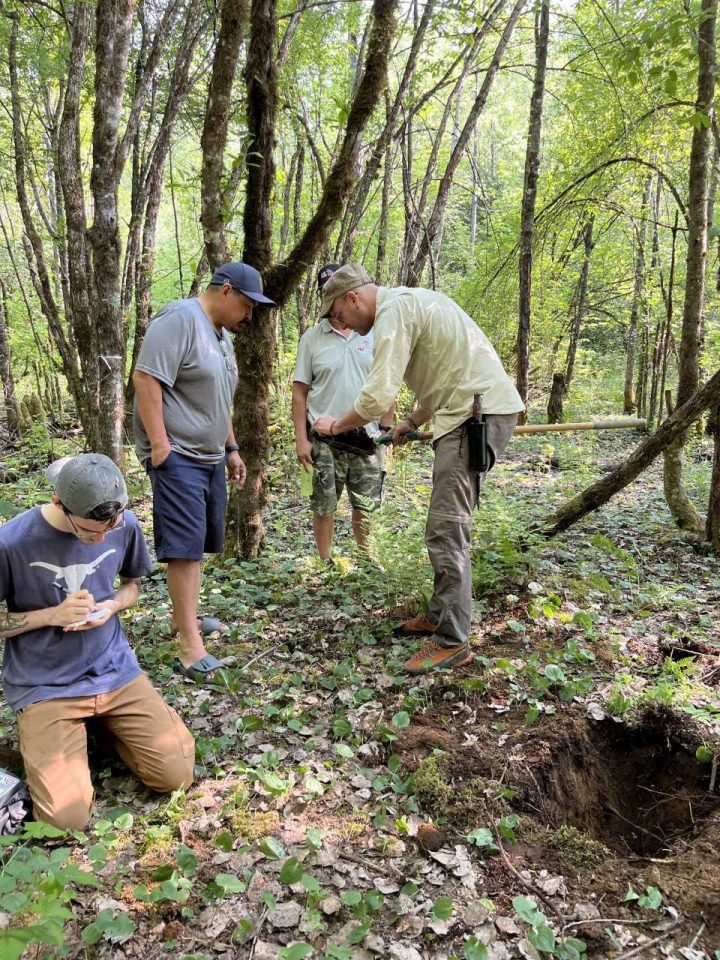Indigenous Forest Gardens Look to Expand

April 2024 – Indigenous communities, including the Ts’msyen, Gitxsan, and Coast Salish Peoples, have successfully managed soils and cultivated foods in forests since time immemorial, and a new research partnership aims to revitalize this traditional and ancestral practice known as forest gardening.
Forest gardens refer to places where food production and forests thrive in tandem – creating a healthy, multifunctional ecosystem where food and medicine plants grow on a broad scale. The land is managed through various practices, like transplanting, fertilizing, and burning, resulting in multi-layered forests of hazelnut, Pacific crab apple, berry crops, and herbaceous root foods and medicines.
In a first-of-its-kind partnership, UBC, Simon Fraser University (SFU) and three First Nations in so-called B.C. are applying novel approaches to measure soil processes and properties, and the downstream impacts on ecosystem health.
“This is the story of a reciprocal relationship with and for Indigenous communities, which plays an important role in the Land Back movement,” says Dr. Jean-Thomas Cornelis, Assistant Professor in UBC’s Faculty of Land and Food Systems, whose team will use biogeochemical metrics to track soil health and soil-plant interactions.
“This collaboration with First Nations can also contribute to rethinking how we teach soil science principles and do research on soils and ecosystems. Our preliminary results on forest garden soils by Alyssa Robinson, an MSc student co-supervised with Dr. Chelsey Armstrong at SFU, show how ancestral Indigenous practices optimize local nutrient circularity and land healing. These practices build ecosystems that preserve biodiversity, and strengthen resiliency and soil health, while producing food and medicines.”

The three First Nations partners are Gitselasu (Ts’msyen) on the lower and middle-Skeena River, Wilp Hanamuwx (Gitxsan) in the Gitsegukla Watershed, and Sts’ailes (Coast Salish) along the Harrison River in the Fraser Valley. Each Nation has an important role in governing and disseminating data, developing research questions, monitoring soil and plant health, and making decisions on pilot sites in keeping with their respective protocols and priorities.
“Sts’ailes is extremely excited about partnering with Dr. Cornelis and his co-researchers, Dr. Chelsey Armstrong and Dr. Jennifer Grenz on the RISE project (Revitalizing Indigenous Forest Garden Stewardship to Enhance Soil Capacity to Sustain Resiliency of Food-Forest Ecosystems) activities,” said Boyd Peters, Director of Sts’ailes Xwilexmet Department.
“Sts’ailes is deeply committed to learning more about how our ancestors looked after the ecosystems around our ancestral settlements and throughout the territory, connecting this knowledge with our own teachings, and applying this knowledge to improve the health and resiliency of our Xa’xa Temexw (sacred earth). We have much to learn and much to share.”
The research partnership also involves co-researchers Dr. Armstrong, Assistant Professor, Indigenous Studies and the School of Resource and Environmental Management at SFU, and Dr. Jennifer Grenz, Assistant Professor in Land and Food Systems and Forestry (Department of Forest Resources Management) at UBC, who will contribute her knowledge in soil microbial ecology and Indigenous research methodologies.
The goal of this NSERC Alliance-funded four-year study is to measure the ecological impacts of forest gardens on soil properties, providing a strong foundation for new policy that supports their expansion across B.C., while recognizing the Indigenous land-use histories and rights to maintain and govern their respective forests. Sts’ailes’ Xwilexmet Department also received project funding through UBC’s Community-University Engagement Support Fund. The research team hopes that forest gardens can be used as one way to restore and revitalize soil and ecosystem resiliency in the province’s temperate rainforests.
Dr. Cornelis said this project required a paradigm shift. Western scientific praxes tend to focus on outcomes that can be broadly applied and scaled up globally. However, research on soil-plant-people relationships requires a highly localized approach that considers culturally and bioregionally distinct contexts and histories.

“This research is place-based – where we see the property of soil and land that is the result of specific interactions with Indigenous communities. Community partners are interested in studying soil-forming processes and their influence on soil carbon sequestration and nutrient cycling in a hotspot of biodiversity. Dr. Armstrong will research plant communities, while Dr. Grenz will investigate soil microbial communities and plant-soil interactions through UBC’s Indigenous Ecology Lab.”
“Applying a community-based approach builds on a strong and long-term relationship with research liaisons and Indigenous place-based knowledge.”
In addition, it acknowledges that temperate rainforests in the Pacific Northwest are not wild and untouched, but that anthropogenic practices over millennia, combined with requisite social institutions and governance structures, helped to shape multifunctional and biodiverse forests, while supporting food production and ecosystem health.
Tagged with: 2024, Applied Biology, Indigenous